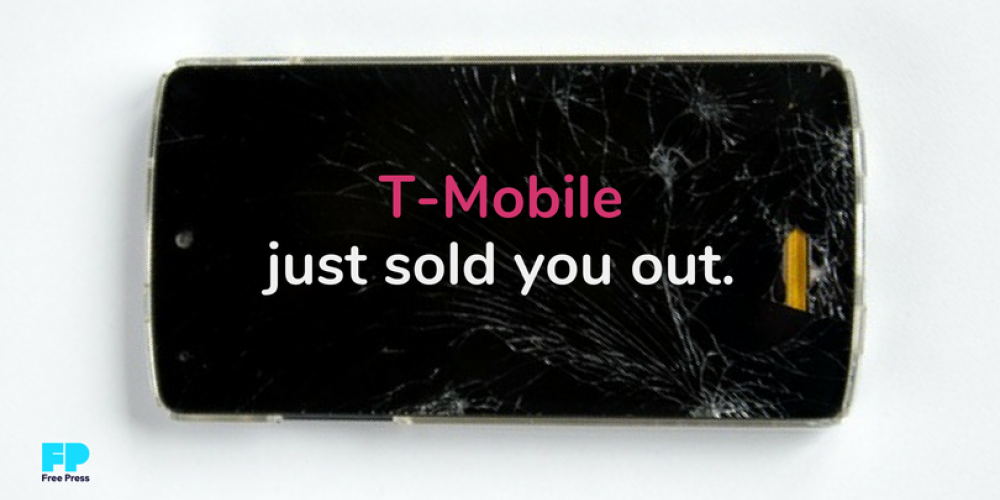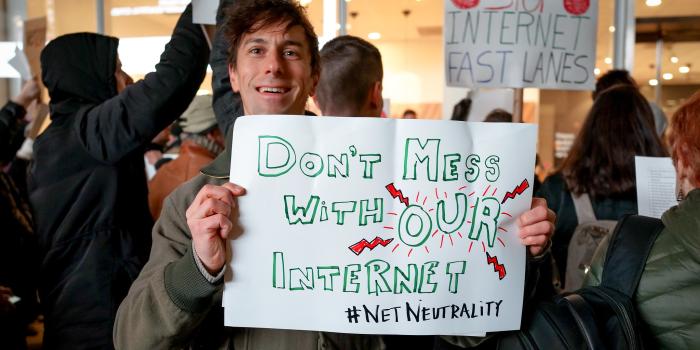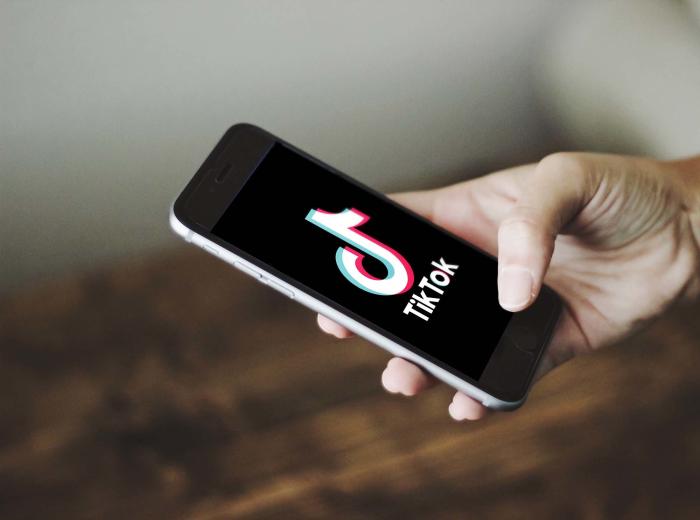T-Mobile Is Selling You Out (and Free Press Is Here to Fight It)

Allow us to reintroduce ourselves.
Free Press is a nonprofit organization that refuses to take money from business, government or political parties. Our independence is too important. And we have the IRS Form 990s to prove it.
T-Mobile is an upstart wireless provider that revolutionized the industry with No-Contract, No-Credit Check plans and a strong focus on customers.
Today we’re adding T-Mobile to our list of bad actors in the telecom industry and urging the FCC to reject its proposed merger with Sprint because it will lead to price hikes, layoffs and the elimination of two competitors that specialize in serving people of color and low-income communities.
For more than 15 years Free Press has stood up to AT&T, Charter, Comcast, Verizon — and other companies with harmful agendas. Big Telecom doesn’t like us much, and they used to dislike T-Mobile, too. But now all that’s changing as the Un-Carrier pushes for a disastrous deal that’s in direct opposition to everything it claims to care about.
Here’s a common-sense breakdown of how T-Mobile has sold out, and why we’re urging the FCC to block its merger.
Don’t believe the hype: Prices will go up
T-Mobile’s PR department has been working overtime to convince employees and customers that this merger will lower prices — but that defies simple logic. Every time T-Mobile cuts its prices, Sprint and other companies create new deals to attract customers in response. If this merger is approved, the loss of two competitors will mean higher prices for everyone.
And T-Mobile’s propaganda isn’t just illogical; it also contradicts recent history.
Since AT&T’s takeover of DirecTV was formally completed in June 2017, it’s pushed a $5 price hike for each of its DirecTV Now streaming plans to a new starting price of $40 a month. Subscribers with grandfathered unlimited-data plans have seen three separate $5 price hikes for a total of $15 more per month within the last three years alone.
When Charter acquired Time Warner Cable and became Spectrum, all hell broke loose. Customers across the country reported price jumps of anywhere from $10 to more than $40 per month.
One customer in Kentucky faced a particularly painful experience:
“Daniel Fitzgerald shares a one-bedroom Lexington apartment with his disabled son. Charter Communications abruptly blacked out most of the family’s cable channels in late March and then demanded a $36 monthly rate increase, plus a $24 service fee, before it would restore them.”
The T-Mobile/Sprint merger will harm everyone, but Daniel Fitzgerald and other people living on low or fixed incomes will be disproportionately impacted. We know this because these two companies serve far more poor people and communities of color than any other provider.
Low-income folks and people of color will suffer the most
Back in 2012, T-Mobile CEO John Legere stormed into the market with a hot-pink focus on customers.
With him he brought No-Contract plans and faster equipment upgrades, which put the newest smartphones into low-income households. He also innovated No-Credit Check plans, which meant the racist credit-rating system could no longer serve as a barrier to entry for people of color. T-Mobile built a reputation for disruption, rejecting business as usual.
Now the company’s lost its way. Its proposed merger would reduce the number of competitors in the wireless market to just three: AT&T, Verizon and a newly combined T-Mobile/Sprint.
We all know the story of AT&T and Verizon, which Free Press Policy Director Matt Wood and Research Director S. Derek Turner recently analyzed:
“AT&T and Verizon each control about a third of the market, and in this position of market dominance have found that ignoring the needs of low-income and credit-challenged communities maximizes their profits. AT&T and Verizon have generally avoided wholesaling capacity to resellers, and have also neglected or scaled back offerings of their own lower-priced prepaid services.”
The subscriber numbers prove it: People with lower incomes and people of color disproportionately choose T-Mobile and Sprint brands. If this merger is approved, the newly formed conglomerate will likely shift to the approach of AT&T and Verizon — and this will be disastrous for these vulnerable communities as well as residents of rural areas who have few options to connect.
Don’t be fooled by the 5G argument
T-Mobile and Sprint claim this merger is necessary to upgrade customers to 5G wireless speeds. That sounds exciting — but in reality, each of these companies was already planning to deploy 5G networks prior to the deal’s announcement.
Both told their investors that they would build and upgrade. The deployment plans are already in place.
These companies are dangling shiny new 5G speeds in front of customers, politicians and anyone who will listen to justify a merger that would benefit only Wall Street.
Bottom line: If this merger goes through T-Mobile will no longer be a customer-friendly company and will instead morph into another AT&T.
Free Press and the fight to stop mega-mergers (with receipts)
Free Press opposes companies that put profits over people, particularly those that control our ability to connect and communicate.
That’s why we’ve led the fight against a variety of harmful media mergers over our 15-year history. The battle against corporate influence at the FCC means taking on some of the richest, most powerful businesses in the world, and making them accountable to the lives and livelihoods they affect.
Here are a few of the deals we’ve fought, with links to our advocacy against each:
-
Comcast’s failed bid to acquire 21st Century Fox earlier this year
-
Charter’s disastrous takeover of Time Warner Cable in 2015
-
Comcast’s failed acquisition of Time Warner Cable in 2015
-
AT&T’s failed attempt to merge with T-Mobile in 2011
-
Comcast’s acquisition of NBCUniversal in 2011
-
Sirius Satellite Radio’s merger with XM in 2007
-
AT&T’s 2006 merger with BellSouth
In the face of heavy lobbying from internet service providers like AT&T and Verizon, we were also instrumental in pushing the FCC to pass strong Net Neutrality rules in 2015 that barred those companies from blocking or discriminating against lawful content online. We successfully defended the rules in court in 2016 and are suing the Trump FCC over its repeal.
And those are just a few examples. Free Press started in 2003, when a handful of people began working together out of a small apartment in Northampton, Massachusetts, to fight unchecked media consolidation, strengthen press freedom, support independent journalism and protect public media.
We realized that media and technology shape society, and shouldn’t be in the hands of just a few rich companies. Everyone should be able to connect — including the millions of people who will be forced to disconnect or scale back their wireless services if T-Mobile is allowed to merge with Sprint.
Right now, it’s up to the FCC to do its job and stop T-Mobile from pushing out the most vulnerable people in our communities. Activists around the country are speaking up, but T-Mobile’s aggressive PR machinery is drowning them out.
That’s where we come in. Free Press’ mission is to make sure that the voices of the public are heard at every level. We won’t sell out and we won’t give in. People like you inspire and fuel everything we do.





